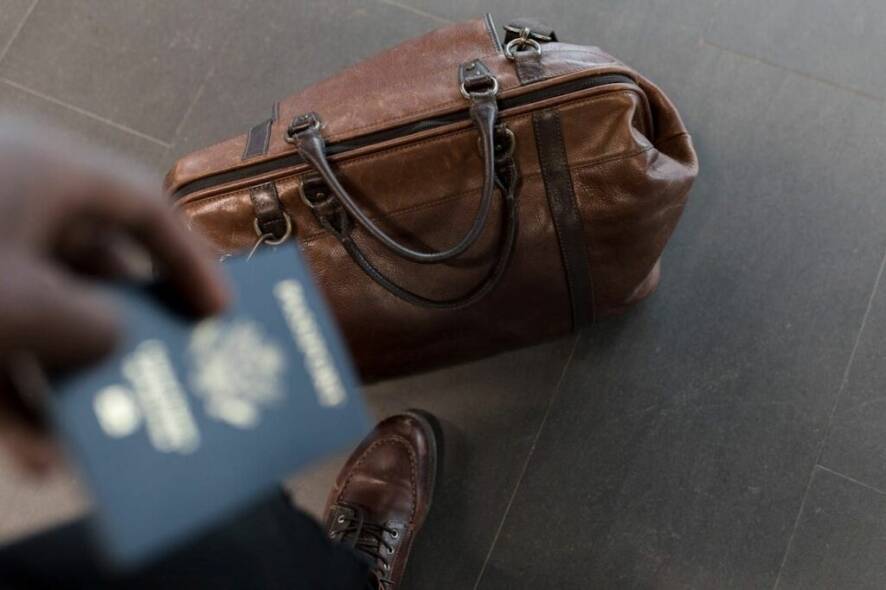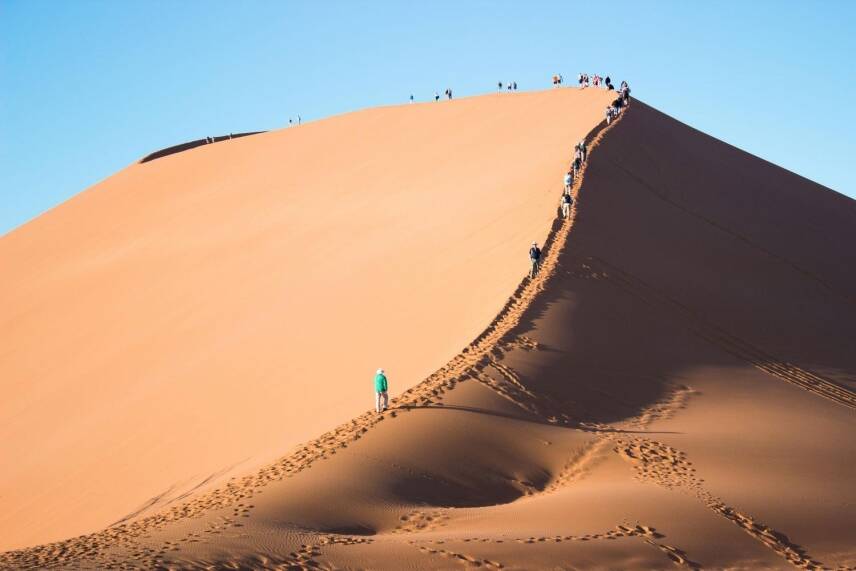Hunting in Namibia allows hunting enthusiasts to experience a first-rate game hunting destination at a reasonable price, with excellent hunting trophies available to target.
[DYNAMIC-BLOGTABLEOFCONTENT]
What to Pack when Hunting in Namibia
This is a common question, and it is a wise option to be properly prepared for a game hunting safari in Namibia! Big game hunting in Namibia takes place in the remotest parts of Africa and retail outlets will certainly not be available. One of the most important considerations when packing and planning is whether the hunting safari in Namibia will take place during the warmer or cooler months. Temperature variation in Namibia can be extreme. When packing for the hunting safari, be sure to check against the below shortlist. These actions are critical and failure to do so can turn hunting in Namibia, or any other destination, into an unpleasant experience.
- With regard to contact lenses or glasses, be sure to have a copy of your prescription readily available.
- A certified copy of your travel documents including passports, visas, and trophy permits.
- Be sure to have a watertight bag for your original documents to prevent damage etc.
- A list of emergency numbers. Your African outfitter will also request this information.
- Ensure you retain the original luggage tags in case items go missing.
- Be sure to pack all the prescription medications, plus an original copy of the prescription.

Hunting in Namibia and International Travel Logistics
Numerous international flights from Europe traverse through South Africa via Oliver Tambo International Airport. Have a chat with your travel agent.
Landing strips are readily available throughout the country. Your booking agent/hunt broker or African outfitter will advise if this is a requirement to get to the hunting grounds. Namibia is an enormous country and long road trips cut into precious game hunting time, keep this front of mind when considering logistics.
Namibia’s main point of entry is Hosea Kutako International Airport (WHK). Other airports do cater for cross border and domestic flights and include:
- Eros Airport (situated in the city of Windhoek)
- In the north of Namibia, Odangwa Airport
- The Okavango region is serviced from Rundu Airport
- The Caprivi Strip, also known as the Zambezi Region, is serviced by Katima Mulilo.
- The Caprivi Strip can also be entered via Kasane Airport in Botswana. A 10-minute drive, followed by a quick boat ride will give international hunters easy access to this region of Namibia.
International airlines flying into Namibia include:
- Air Namibia
- Lufthansa
- Delta
- Qatar
- South African Airways
Health and Vaccines Pre-Hunting Safari
Before embarking on your dream Namibia big game hunting safari, check with your booking agent as to recommended vaccines and precautions before travel.
The below considerations are highly recommended:
- Malaria: Most of Namibia is malaria but regions such as the Zambezi Delta ( Caprivi Strip) could be malaria hot spots. Liaise with the African outfitter and then consult with your medical practitioner to obtain a recommended prescription.
- Typhoid: This is recommended for most travelers when crossing most African borders.
- Yellow Fever: This may be a requirement when traveling to and from countries with a risk of Yellow Fever
- Rabies: Never pet strange dogs or animals while on your hunting safari.
- Hepatitis A & B: These vaccines are recommended for members of the hunting safari who are not vaccinated.
Visa Requirements when Embarking on the Game Hunting Safari
- International hunters visiting Namibia need to have a valid passport which will not expire six months before the commencement of the hunting safari. The passport will need to have at least three blank pages available for processing.
- Temporary Visas for hunters will be granted on arrival allowing the hunters to remain within Namibia for not more than 60 days.

The Namibia Professional Hunting Association (NAPHA)
- NAPHA was founded in 1974 with the mission of promoting Namibia as a leading African hunting destination.
- NAPHA works closely with the World Wildlife Fund and the Namibian Government, Department of Environment and Tourism.
- It currently has over 350 registered members, namely hunting guides and professional hunters.
- NAPHA Mission Statement: The fundamental purpose of NAPSA is to enhance and maintain, by effective management, an organization infrastructure that can serve professional hunting members, clients, and other interested members. The intent is to promote ethical conduct, and sustainable utilization of natural resources, and to secure the industry for current and future generations.
- Members of NAPHA are expected to follow ethical principles and hunt as per the hunting code.
Namibian Professional Hunter Categories
When it comes to hunting qualifications and industry expectations, Namibia has exceptionally high standards and the quality of personnel is well respected internationally. Hunters need to ensure that the hunting safari is booked with Namibian Outfitters who are registered with the Ministry of Environment, Forestry, and Tourism as well as the Namibian Tourism Board. Your hunt broker/booking agent will have all the information available.
Qualified hunting professionals are broken down into three classification types, namely:
- Hunting Guides: This classification is the entry-level position allowing hunting guides to hunt their own ranches. Hunting guides can also conduct safaris at a ranch where they are employed, or at a registered conservancy.
- Master Hunting Guides: The Master Hunting guide may also conduct hunting safaris on an additional two ranches if the hunting rights are registered in their name.
- Professional Hunters: A registered and qualified professional hunter needs to complete a two-year apprenticeship with a registered Namibian professional hunter before taking on the challenging practical and theoretical exams. Once qualified, a Namibian professional hunter may conduct hunting safaris throughout the country, with the written permission of the landowner.
Once the exams are completed and the professional hunter has successfully qualified, the PH may enroll for additional specialist qualifications, namely:
- Big Game Professional Hunters: A registered professional hunter who has completed the Big Game examination
- Bow Hunting Professional Hunters: A registered professional hunter who has completed the additional bow-hunting qualification.
Namibian Tourist Attractions and Activities
Namibia is not only well known for safari hunting, but this beautiful country has a wide selection of tourist attractions and non-hunting activities. It is strongly suggested that the hunting safari in Namibia be extended by a few days and include a few of the below attractions on offer.
Etosha National Park
This national park situated in Northern Namibia has an enormous variety of animals, including the Black and White Rhinos, Leopards, Cheetahs, and Lion. The Etosha Pan is vast and bare and covers an enormous area sporting abundant birdlife including the Flamingo. This unique feature can be seen from space. Available accommodations in the park are beautifully constructed offering fantastic views of the African landscape.
The Skeleton Coast
Namibia’s Skeleton Coast got its name from the whale and seal bones that used to litter the shore. It is an area that is 40km wide and 500km long. It is an interesting and intriguing area, where the warm air of Namibia’s desert meets the Atlantic’s cold Benguela current, in a crashing of waves, turbulent weather, and unforgettable memories.
The area is breathtakingly beautiful and is also home to the desert-adapted elephant, a majestic beast that resides in the area. Other species that you can view during game-watching activities include rhinos, desert lions, brown hyenas, jackals, giraffes, seals, oryx, kudus, and zebras
Zambezi Region (Caprivi Strip)
Formerly known as the Caprivi Strip, the Zambezi region is situated in northeast Namibia. Bordered by Zambia, Angola, and Botswana, the area is known for its rich wildlife and lush vegetation. This is an example of what “real” Africa looks like…unfenced and wild, with its lush vegetation making it the perfect habitat for numerous species of mammals, reptiles, and many varieties of birdlife, as well as the perfect stop for an eco-tourism post-hunt tour.
Fish River Canyon
The US may have the Grand Canyon, but Namibia is home to the Fish River Canyon, the largest African canyon and the second most popular tourist attraction in Namibia. Situated in the south of the country, the views from the Fish River Canyon are mesmerizing, and it reaches a depth of nearly 1,950 feet!
Swakopmund
Swakopmund is seen as the area for fun and games, with many different adventure activities available in this town! From camel rides and desert tours to quad biking in the world’s oldest desert and even sky diving, Swakopmund is an adventure lovers’ playground!
“Big Daddy” Sand Dune at Sossusvlei
You have not lived until you have tried to climb Big Daddy, it’s as simple as that! Standing a majestic 1,066 feet, this dune simply towers above the others in the region and is well worth the effort of climbing it! You may think that it is an easy climb, and it can be, should you attempt it early in the morning, before the sun beats down on the hot sand. But anytime you go, you can rest assured of absolutely stunning views!
Windhoek
Namibia’s capital city is well worth a visit for its historical and city tours, as well as the chance to down a cold one up on the infamous Hilton Hotel’s Sky bar that offers visitors gorgeous views over the city.
From game drives and township tours to craft markets and delectable German cuisine, Windhoek is well worth a visit.
Cuisine while Hunting in Namibia
As with any African destination and game hunting adventure, you can expect the cuisine on your hunting safari to be top-notch. It should not be too exotic for your taste buds and generally, you should recognize many of the dishes served.
Local dishes will most likely include venison, which is game meat that can be prepared in numerous ways, including pies, potjies, and, of course, steaks on the braai! Other meats such as beef, chicken, and lamb are sure to be on the menu. This, paired with local wines, makes a mouthwatering meal.
Don’t be surprised if you return home with your pants sitting a bit tighter than when you arrived!
Why choose Namibia as Your Hunting Safari Destination?
- Namibia is seen as one of the safest game hunting destinations in Africa.
- Not only that, but it also offers competitive pricing on hunting safaris when compared with other African game hunting destinations.
- It is also the only country where a hunter can still legally target a cheetah.
- It is the only country where all members of Africa’s Big 5 can be hunted. (Although it is legal to hunt leopards in South Africa, tags for this member of the Big 5 and Dangerous 7 have not been issued for many years).
- Namibia’s diverse game hunting offering has something for everyone, from the novice to the experienced game hunting enthusiast.
- From the diminutive Damara Dik-Dik to the large African elephant, Namibia’s game options provide great variety and challenging hunting safaris.
- The difference in terrain allows hunters to challenge themselves in a variety of environments, from the arid Kalahari to the lush Caprivi Strip.
Namibia: An All-Round Game Hunting Destination
This diverse African destination provides hunters and observers with an amazing African hunting experience. It couples exceptional hunting with a wide variety of safe and exciting tourist activities spread throughout the country.
From north to south and east to west, Namibia proves to be a playground for those wanting to explore the varied secrets this African gem holds.
Author: P.C. van Wyk
